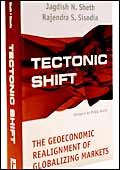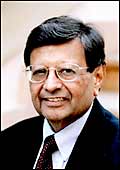 |
TECTONIC SHIFT
Jagdish N. Sheth and Rajendra S. Sisodia
Response Books
PP: 350
Price: Rs 550 |
Globalisation
just has to be the most written about subject in recent history.
Run a search for the word on Amazon books and you get 3,466 results.
Writers on the subject range from Thomas Friedman to Kenichi Ohmae
to Jagdish Bhagwati to Joseph E. Stiglitz. So when you come across
a book like Tectonic Shift, one is tempted to state-much like
the gentleman from the US patent office of early 1800s-that everything
that can be written on globalisation has been written. But guess
what? Such sweeping statements tend to be egregiously wrong, be
it the early 19th century or the 21st. For, Tectonic Shift-penned,
surprisingly, by two marketing experts-isn't about why globalisation
is inevitable, how it will shift economic balance from the developed
countries in the west to developing countries in the east, yada
yada...Most of all, Sheth and Sisodia's work is about predictions-make
that bold predictions-about how the global economic boundaries
will meld in another two decades. Like marketing guru Philip Kotler
says in his foreword to the book, "it is to Sheth and Sisodia's
credit that they offer a penetrating analysis of where the future
of different countries is going under the pressure of geoeconomic
forces".
How does the world in Sheth and Sisodia's
view-the former is a professor of marketing at Goizueta Business
School in Emory University, Atlanta, and the latter, also professor
of marketing at Bentley College, Waltham-look by 2020? Let's start
with Europe. According to the authors, for Europe, "the former
Soviet states will provide the 'developing world' through which
its stagnating economy will refuel itself". In other words,
expect a much bigger and more powerful EU, where the already prosperous
economies will find trading partners in the poorer East European
countries. As for the Americas, they will find reason enough to
create an FTAA, i.e., the Free Trade Area of the Americas, including
the US, Canada, and South America. "FTAA is the destiny of
the Americas, and our prediction is that it will stay on track
for implementation-perhaps as early as 2010", the authors
say. Similarly, Sheth and Sisodia propose, Asia will create its
own enlarged free trade zone, where Japan and China (despite the
heavy odds against it) will be closer than before, and new members
will include countries like Australia and New Zealand, besides
those of ASEAN.
Most of the authors' predictions seem reasonable,
if not predictable, enough. But relentless as the economic forces
are, let us not underestimate the paralysing power of volatile
global politics. That still remains the single-biggest challenge
to globalisation.
Q&A: JAGDISH SHETH
"Jobs And Wealth Creation Will Drive 21st Century"
 Recently
in India to launch his book, Jagdish
Sheth spoke to BT's Archna Shukla on
why he expects a global tectonic shift. Recently
in India to launch his book, Jagdish
Sheth spoke to BT's Archna Shukla on
why he expects a global tectonic shift.
What'll be different about the 21st century?
While the 18th century was about ideologies
and wars, the current century will be about markets and economies.
In the 21st century, it will be jobs, wealth creation and economic
growth that drive nations.
Which nations will be at the forefront
of this re-revolution?
Developing economies will drive the world
in 21st century. One reason for this is that advanced economies
are ageing very fast. And if a country doesn't have enough population
growth, its domestic economic growth will suffer. Then, they will
need to get growth from elsewhere like developing countries.
What will be India and China's role in
the new world order?
India, China and the US will be the three
main economic superpowers that will shape the first half of the
current century. And the relationship between these countries
and their relations with other countries will determine world
relations.
|





 R
R